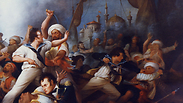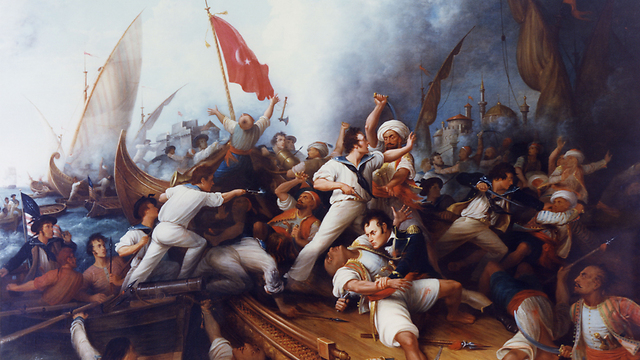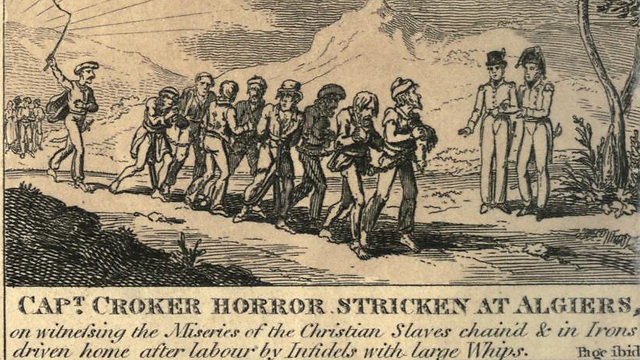
Lessons from the shores of Tripoli
Insight: West's current campaign against Islamic State radicals should look back to America's Barbary Wars, when the new state first's foreign policy failed to appease Islamist pirates.
At first glance, America seems to be struggling with how to adequately respond to the Islamic State terror group. The might of the world’s most powerful army is barely being felt by what is essentially an organized group of bandits.
A state of the art military responsible for the "shock and awe" that utterly decimated the Middle East’s largest army in a matter of days just ten years ago seems incapable of carrying out more than limited pinpoint strikes on tactical, rather than strategic, targets.
That the Obama administration has elected to manage the crisis, rather than achieve victory, is evidenced by the minimal force being focused on these minor tactical targets. President Obama would be wise to read a bit of his great nation’s history and learn from America’s past victories.
America’s battle with ISIS is not her first military adventure in the Middle East, nor is it America’s first time facing kidnapping, enslavement, and extortion by Islamic extremists from Muslim lands. What few know or recall is that America’s first foreign war started just a few years after the nascent state earned its independence, at a time America’s future role as a military power was neither imagined nor even an ambition.

America’s leadership in the early 1780’s believed that Unites States should not be a country to exercise military power. In fact, the federal government lacked the legal authority to even commission a navy, which at the time was the core element of any strong military. After suffering at the hands of British imperialism, many of the United States’ founders were very sensitive to how power could be misused and believed that benevolence promoted benevolence.
Upon declaring independence, however, the United States' maritime commerce no longer fell under the protectorate of the Royal Navy, making American vessels easy targets for pirates operating off the Horn of Africa, most of whom were Islamic. American sailors were kidnaped and sold into slavery in the Middle East and North Africa.
Harold Rhode, an expert on Islamic culture and the Middle East explains that historically “it is acceptable according to the Sharia, to raid the infidels, kidnapping and enslaving non-Muslims. This has been a common practice throughout Islamic history."
Much like today, the United States’ initial reaction to radical Islam was one of appeasement. In the 1780's the federal government began paying tributes to the Muslim states harboring the pirates. As time went on, the cost of these tributes greatly increased and the pirates continued to kidnap American citizens and seize American merchant vessels.
The US government tried throughout the 1780’s to resolve the conflict through diplomatic means and, in 1785, held a high level meeting in London between officials from the US and Tripoli. Tripoli’s ambassador explained that “it was written in the Koran… that it was their (the Muslims) right and duty to make war upon whoever they could find and to make Slaves of all they could take as prisoners, and that every Mussulmen who should be slain in battle was sure to go to Paradise.”
The notion that a military solution would be required began to arise within the public discourse in the mid 1780’s. Joshua London, the author of Victory in Tripoli: How America's War with the Barbary Pirates Established the US Navy and Shaped a Nation (John Wiley & Sons, 2005), explains that "in debating the needs of the country and the limits and burden of taxation, raising funds for naval armament was hotly contested. Despite overseas threats and active belligerence to US maritime interests and active pirate captivity of American sailors (US citizens), it was not until 1794 that Congress finally authorized and funded a Naval force."
Well before the establishment of a naval force the US continued their appeasement program which gradually became more expensive. At first, America used her small navy to manage the conflict on a tactical level by providing armed protection for vessels traversing the open seas on their way to do business in Europe. The pirate attacks continued, however, as no strategic gains were achieved.
Finally, the United States decided to depart from the European model of tribute payments and simple defensive measures to ward off attacks. Instead, American warships began actively hunting pirates and striking ports along the Barbary Coast. The still young US Marines Corp began launching amphibious raids into Islamic territory to liberate American captives and strike a psychological blow to the enemy.
London noted "the moment most lauded in folklore was the 1804 burning of the USS Philadelphia during a commando-style night-time raid by Lt. Stephen Decatur and a handful of men in the harbor of the enemy, essentially right under the nose of the nation's chief Barbary antagonist. At the time, British Admiral Horatio Nelson called this "the most bold and daring act of the age."
ISIS today is in many ways the same marauding Muslim bandits who challenged the fledging United States more than two hundred years ago. Both use religion as a justification or motivation for mayhem, murder, kidnapping and enslavement of anyone deemed a non-believer. Recently, prompted by months of kidnappings, enslavement, extortion and brutal killings, President Obama finally decided to act.
However, as at the start of the Barbary Wars, President Obama has shied away from decisive and strategic military maneuvers, instead opting for limited tactical, and sometimes symbolic, air strikes. Much like the early stages of the Barbary conflict, the United States has little to show for its endeavors. ISIS still holds wide swaths of territory, is consolidating its hold on that land and seeks to expand into other areas of Iraq, Syria and elsewhere.
As in the early 19th century, it is not too late for America to change course and take strong strategic action against this latest threat to emanate from Islamic lands. The longer the United States delays, the greater the risk. Rhode explains: “the longer America waits to solve this problem, the more dangerous it will become for America and the world. If America is not prepared to put boots on the ground then we must supply and train those who will, specifically the Kurds.”
In the 19th Century, the threat posed by the marauding Islamic radicals was limited to a specific, albeit strategic, geographic area. In the age of globalization, with ISIS armed with 21st Century weapons and state of the art propaganda tools, a failure to defeat, rather than just manage the crisis, is already having repercussions, not just in Iraq and Syria but all across the Middle East, Europe, and the world.
The events in Paris two weeks ago are only the beginning if the West, under American leadership, does not act decisively.
Eitan Charnoff is a former officer in the IDF Spokesperson's Unit and a volunteer medic. He holds a BA in persuasive communications from the Interdisciplinary Center in Herzliya.











